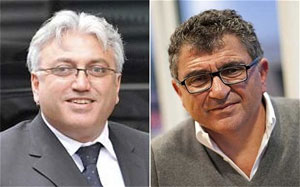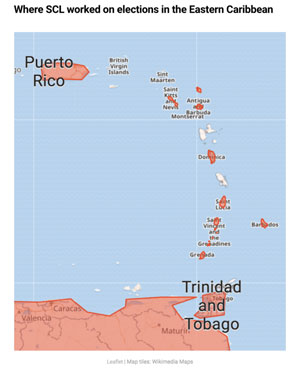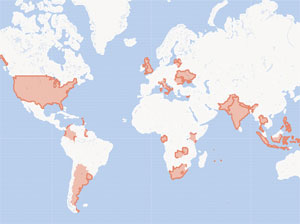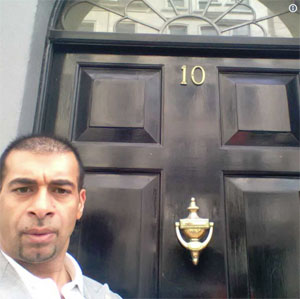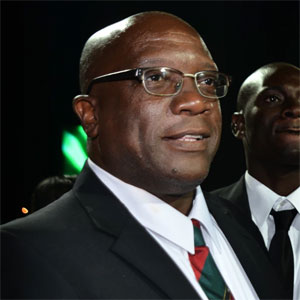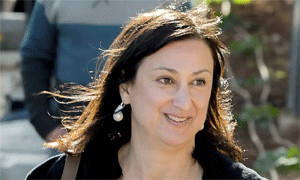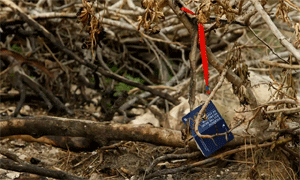Vincent Tchenguiz also helped controversial 'private intel agency' apply for Israeli government grant for developing dual-use technologies; Economy Ministry won't say if it got one
by Times of Israel Staff
8/23/18
NOTICE: THIS WORK MAY BE PROTECTED BY COPYRIGHT
YOU ARE REQUIRED TO READ THE COPYRIGHT NOTICE AT THIS LINK BEFORE YOU READ THE FOLLOWING WORK, THAT IS AVAILABLE SOLELY FOR PRIVATE STUDY, SCHOLARSHIP OR RESEARCH PURSUANT TO 17 U.S.C. SECTION 107 AND 108. IN THE EVENT THAT THE LIBRARY DETERMINES THAT UNLAWFUL COPYING OF THIS WORK HAS OCCURRED, THE LIBRARY HAS THE RIGHT TO BLOCK THE I.P. ADDRESS AT WHICH THE UNLAWFUL COPYING APPEARED TO HAVE OCCURRED. THANK YOU FOR RESPECTING THE RIGHTS OF COPYRIGHT OWNERS.
NEW LIGHT ON FUNDING, TIES OF SECRETIVE ISRAELI SPY FIRM
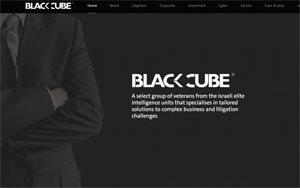
Black Cube's internet homepage (screenshot)
Vincent Tchenguiz, an Iranian-born British entrepreneur and property tycoon who until 2015 was the largest shareholder in the parent company of the scandal-hit data firm Cambridge Analytica, also played a prominent role in the founding stages of the controversial Israeli business intelligence company Black Cube, and provided it with vital funding, according to a 2013 Israeli lawsuit filed by lawyers for Tchenguiz.
Tchenguiz, whose family is of Iraqi-Jewish origin, fell out with the secretive Israeli company and its founders and sued it for fraud and other alleged offenses, seeking almost a million pounds in damages. The case, which received very little media coverage at the time, was ultimately settled out of court.
Black Cube, which was founded in 2011 and whose former honorary board president was the late Mossad chief Meir Dagan, has been at the center of considerable international press scrutiny in recent months.
Many of the company’s reported behind-the-scenes activities — including its work in Romania, its work on an election campaign in Hungary (where it denies involvement), its involvement in the Harvey Weinstein scandal, and its activities relating to the Iran nuclear deal, when it allegedly conducted a “dirty ops” campaign against former Obama administration officials — have made headlines worldwide.
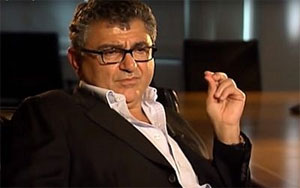
Vincent Tchenguiz (YouTube screenshot)
Cambridge Analytica and its parent company SCL Group, too, have been the subject of intense media attention, with the FBI and US Justice Department reportedly investigating the now-defunct Cambridge Analytica over its role in the 2016 election campaigns of US President Donald Trump and other Republican politicians, including the harvesting and alleged illegal use of personal data of tens of millions of Facebook users.
Black Cube — which calls itself a “private intelligence agency” and employs former members of Mossad and other Israeli intelligence units — has denied any links to Cambridge Analytica or any of its subsidiaries. (Last month, the British Parliament’s Culture, Media and Sports Committee issued a report alleging that Black Cube had engaged in election-related hacking in Nigeria on behalf of SCL-linked companies, citing testimony it heard in March by Cambridge Analytica’s former research director Christopher Wylie; however Wylie retracted this allegation in US Senate testimony in May, and it was also denied by Brittany Kaiser, who managed Cambridge Analytica’s project in Nigeria, in written testimony to the British committee.)
In the 2013 lawsuit, which was filed days after Black Cube had sued Tchenguiz in the UK for breach of contract and unpaid bills, Tchenguiz’s lawyers claim that their client played a prominent role in the founding stages of Black Cube, and provide documentation to support this assertion.
If Tchenguiz, SCL Group’s largest shareholder until June 2015, indeed played a such a role in Black Cube in 2011-12, this sheds new light on two mysterious companies that are alleged to have been involved in political influence campaigns worldwide.
The 2013 Israeli lawsuit was brought by a private company, Vincos Ltd., of which Tchenguiz was the beneficial owner. In the suit, filed in Tel Aviv District Court, Tchenguiz claims that the setting up of Black Cube was partly his initiative.
“Defendants 3 and 4 [Black Cube founders Dan Zorella and Avi Yanus] entered into a contract with the plaintiff [Vincos Ltd.] according to which defendant 3, defendant 4 and the plaintiff agreed to jointly establish a company that provides business intelligence research,” the complaint reads.
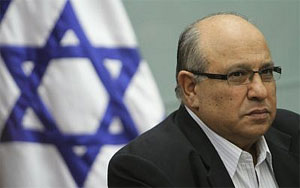
The late Mossad chief Meir Dagan (Miriam Alster/Flash90)
Furthermore, the lawsuit indicates that Tchenguiz provided vital early funding for Black Cube, with the option of making a larger investment at a later date. “The plaintiff intended to invest in the company in the future and agreed to fund various projects involved in the company’s development, according to the cost plus business model whereby the defendants would have their costs covered by the plaintiff and receive an additional 15 percent on top of that,” it states.
In addition, Tchenguiz allowed the UK branch of Black Cube to operate from a London office he owned for the nominal monthly rent of one British pound, the suit states.
For over a year, from December 2011 until December 2012, Black Cube prepared weekly reports for Tchenguiz, some of which were provided as exhibits in the lawsuit, describing the projects the company was working on and the number of hours it spent on each project. Every Sunday, company founders Zorella and Yanus spoke by phone with Tchenguiz or his representative, the complaint in the lawsuit claims. Tchenguiz was apprised of all the company’s activities, documents attached to the lawsuit show, not merely those that concerned his own affairs — underlining the extent of his involvement in Black Cube.
Tchenguiz also helped the company apply for a grant from the Office of the Chief Scientist in the Israeli Economy Ministry, under a program that incentivizes entrepreneurs to develop dual-use military and civilian technologies for commercial export.
A spokeswoman for the Economy Ministry refused to say whether Black Cube received the grant. (In an unrelated case reported last year by The Times of Israel, the Economy Ministry gave taxpayers’ money totaling some $270,000 to a company at the heart of Israel’s now-outlawed binary options industry in order to help it expand abroad, even though the ministry had been warned in advance that the binary options industry was blighted by fraud; the ministry failed for two years to publicize the grant, in breach of its legal obligations.)

David Geclowitz and Ron Weiner, employees of the Israeli private intelligence firm Black Cube, being brought to the appeals court in Bucharest, after their arrest on suspicion of spying on the country’s chief anti-corruption prosecutor, April 12, 2016. (screen capture: YouTube)
According to Israeli law, any Israeli company exporting technologies that involve military-related equipment, know-how or services must receive an export permit from the Defense Ministry. When queried in November 2017 by MK Tamar Zandberg (Meretz) as to whether Black Cube had sought and received such a permit, Avi Abuhatzera, an adviser to Defense Minister Avigdor Liberman, replied, in a letter seen by The Times of Israel, that the Defense Ministry had asked Black Cube whether it was exporting military products or know-how that fall under the law’s regulations. Black Cube had replied in the negative, Abuhatzera told Zandberg, and the Defense Ministry had concluded, on the basis of this reply, that the law requiring a military export permit did not apply to Black Cube.
While the company’s activities may have changed in the intervening years, documents filed in the 2013 lawsuit reveal that Black Cube applied for the Economy Ministry’s Magnet/Meimad grant, which was specifically geared towards military exports abroad, and that the Defense Ministry may have even been a client of Black Cube at the time of the lawsuit.
‘Not transparent enough’
On March 23, 2013, Vincos Ltd., a British company owned by Tchenguiz, sued the defendants B.C. Strategy Ltd., also known as Black Cube Israel, its daughter company B.C. Strategy UK Ltd (Black Cube UK), the company’s founders Zorella and Yanus, and an additional employee, in Tel Aviv District Court.
Tchenguiz accused the defendants of fraud, breach of contract and unlawfully enriching themselves. He sought £924,790 in damages.
According to the complaint, Tchenguiz says he met Zorella in 2010 when the latter was an employee of a business intelligence firm called Businessscope. Businessscope was founded in May 2010 and its initial directors were Shai Schiller, Itay Yonat and Doron Dabby, later to be joined by Gadi Aviran, all of whom are well-known figures in Israel’s WebInt (web intelligence) industry. (These latter four names are cited on the relevant Israeli corporate documents. Apart from the claims in the lawsuit, there is no evidence of which The Times of Israel is aware that Zorella was a Businessscope employee.)
According to the complaint, a company owned by Tchenguiz held a 17 percent ownership stake in Businessscope. On March 10, 2011, when the British Serious Fraud Office raided Tchenguiz’s home and office — on suspicions that he had conspired to cause the collapse of Iceland’s Kaupthing Bank in 2008 — Tchenguiz turned to Businessscope, he said, and specifically to Dan Zorella, to help him fight the allegations.

A view of Reykjavik, Iceland’s capital. (CC BY-SA 3.0 Andreas Tille/Wikipedia)
After a short period of dealing with Businessscope, according to the complaint, Tchenguiz felt the company was not being sufficiently transparent in its dealings with him.
Zorella had a short time before, on March 7, 2011, set up his own Israeli business intelligence company, which he called Zorella Ltd; he later changed its name to B.C. Strategy Ltd., aka “Black Cube.”
Tchenguiz, according to the complaint, said he paid Businessscope £21,000 to allow Zorella to work with Tchenguiz through this new company, Black Cube. Tchenguiz said he agreed to pay the operating expenses of Zorella’s new company, starting in December 2011, plus 15 percent profits.
According to the complaint, Vincos Ltd. paid Black Cube a total of £844,790 over a period of 13 months — from December 2011 till December 2012.
Tchenguiz and Zorella had agreed that Black Cube would do research into Kaupthing Bank — a project they had dubbed “Athena” — as well as seek out new projects and clients. Black Cube’s work on behalf of Tchenguiz led the Serious Fraud Office to eventually in 2014 drop the case against him [paywall], pay millions of dollars in damages and publicly apologize to him.
Throughout 2012, Vincos Ltd. received detailed weekly reports of Black Cube’s activities and paid the company on the basis of these reports, according to Tchenguiz, who attached several pages of these reports to the complaint.
As asserted in the complaint, “the plaintiff periodically received from the defendants a detailed budget for the various projects Black Cube was involved in and the plaintiff paid the defendants on the basis of detailed descriptions of the company’s expenses which they sent him. In addition, almost every Sunday there was a phone conversation between the plaintiff and defendants in which they detailed all the work and activity that Black Cube had undertaken over the past week and the plaintiff approved payments to the defendants on the basis of these presentations.”
In addition, on February 4, 2012, Tchenguiz and B.C. Strategy signed an agreement, attached to the complaint, stating that for the next five years Tchenguiz had the option to acquire 49 percent of the company and to appoint himself as a director.
According to the complaint, however, Tchenguiz began to suspect that Zorella and Yanus had padded their reports and charged him for work they had never done. This caused Tchenguiz to stop paying them and immediately halt negotiations over the option agreement. He then sent a letter to Israel’s Economy Ministry saying he would no longer be investing in B.C. Strategy and was withdrawing his support for B.C. Strategy’s application for a grant under the Magnet/Meimad program.
On March 8, 2013, Black Cube’s lawyers sent Vincos a letter demanding payment of £336,708, and subsequently sued him in the UK, a development that was covered in the British press. Vincos sued the company in Israel on March 23, an event that received minimal media coverage. Both cases were ultimately settled out of court. In April 2013, the Guardian reported that Tchenguiz had settled his dispute with Black Cube and that “the terms of the deal were not disclosed but include an undertaking not to discuss further details with the media.”
Tchenguiz’s lawyers attached several pages of Black Cube’s weekly reports [see link] to the complaint.
Several of the names mentioned in these reports are still in the headlines in 2018, although there is not enough information available to determine the nature of Black Cube’s association with these entities. For instance, Black Cube researched the Icelandic law firm Logos, whose managing partner Gunnar Sturluson was also a board member at the Icelandic firm FL Group, a company that has been in the media spotlight for being a heavy investor in several of Donald J. Trump’s real-estate projects.
Other questions raised by the reports include:
Why was Black Cube interested in Iran sanctions?
What, if anything, did it have to do with an Egyptian gas deal?
And did Black Cube do work for Israel’s Defense Ministry, as the reports in the complaint suggest?
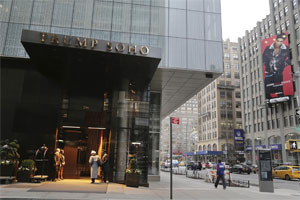
The Trump Soho was funded in part by Iceland’s FL Group (Seth Wenig/Associated Press)
SCL Group and Tchenguiz
SCL Group and Cambridge Analytica are part of a tangled web of companies that even a UK parliamentary committee has struggled to map, as the committee explained in a report last month entitled “Disinformation and ‘fake news’: Interim Report.”
“Much effort has been expended in trying to untangle the complex web of relationships within what started out as the SCL (Strategic Communications Laboratories) group of companies, in which the founder Nigel Oakes and Alexander Nix have been involved, along with a myriad of changing shareholders,” reads the report.
“Christopher Wylie told us, in March 2018, that everyone who worked for Cambridge Analytica was ‘effectively’ employed by SCL: ‘When I started in June 2013, Cambridge Analytica did not exist yet. It is important for people to understand that Cambridge Analytica is more of a concept or a brand than anything else because it does not have employees. It is all SCL, it is just the front-facing company for the United States.'”
The UK parliamentary committee cited a May 2017 chart created by investigative journalists Wendy Siegelman and Ann Marlowe that includes 30 companies interlinked within the SCL Group, but noted that the structure had since changed.
What is clear, however, is that from 2005 to 2015 Vincent Tchenguiz was SCL Group’s largest shareholder. During this period, in 2014 and 2015, SCL Group held meetings with Lukoil, Russia’s second-largest oil company, according to the New York Times. Lukoil is under US sanctions and has strong Kremlin ties.
Also in 2015, when Tchenguiz still owned shares in SCL Group, the company or one of its affiliates allegedly intervened in elections in Nigeria. In a section devoted to SCL Group, last month’s UK parliamentary committee report stated that “We received disturbing evidence, some of which we have published, some of which we have not, of activities undertaken by the SCL-linked companies in various political campaigns dating from around 2010, including the use of hacking, of disinformation, and of voter suppression…“
According to Wylie’s testimony to the British parliamentary committee, when Robert Mercer and Steve Bannon (later Donald Trump’s campaign director and White House chief strategist) were finalizing the establishment of Cambridge Analytica, “they got rid of Tchenguiz [as a shareholder in SCL Group]. The Mercer lawyers didn’t like Tchenguiz’s involvement. He had fairly sketchy business dealings that they didn’t want to be associated with.”

White House Chief Strategist Steve Bannon listens as President Donald Trump speaks during a meeting on cyber security in the Roosevelt Room of the White House in Washington, Tuesday, Jan. 31, 2017. (AP Photo/Evan Vucci)
It is unclear what business dealings Wylie was referring to. But UK Companies House filings reveal that Tchenguiz was for a time an investor in a company in which Ukrainian oligarch Dmytro Firtash, who is wanted in the US for bribery and other allegations, was also an investor, as described by journalist Ann Marlowe.
Black Cube, in response to The Times of Israel’s requests for comment, said in a statement: “This is an example of sensationalist reporting on Black Cube of absolutely no value. This story, which is from five years ago, has been dug up, twisted and is completely misleading the readers.”
Vincent Tchenguiz’s Consensus Business Group did not comment on its relationship with Black Cube but sent the following response with regard to SCL Group.
“Consensus Business Group invested in SCL in 2005 taking a 24% stake in the business. The investment was made on the basis that the company was intending to develop a major emergency response and strategic communication centre capability for clients.
“When SCL’s business model failed, Consensus Business Group lost interest in the investment and began negotiating an exit from the business in 2013. It finally sold its stake back to SCL’s management in 2015 at a loss.
“Consensus Business Group was a financial investor and not involved in the day to day management or operations of SCL. The investment in SCL was just one of many investments made by Consensus Business Group during the period from 2002 to 2008.”
Spies for hire
In July, Politico reported that Black Cube had secretly recorded representatives of Hungarian NGOs as part of a campaign to discredit the opposition in the run-up to Hungary’s national elections. (Black Cube has denied involvement.)
In 2016, two Israeli Black Cube employees were arrested in Romania for harassing and spying on the country’s anti-corruption czar and later pled guilty to the charges.

In this May 25, 2018 file photo, Harvey Weinstein, center, listens during a court proceeding in New York during his arraignment on rape and other charges. (Steven Hirsch/New York Post via AP, Pool)
Black Cube was also reportedly hired by disgraced movie mogul Harvey Weinstein to discredit women accusing him of rape. (A Black Cube board member later apologized for Black Cube having worked on Weinstein’s behalf.)
Other players
Black Cube is not the only Israeli company that has come under fire for reportedly exporting military-grade spy tools and techniques to deep-pocketed international clients.
In May of this year, the New York Times and Wall Street Journal reported that a now-defunct Israeli company called Psy-Group was being investigated by the FBI in connection with Special Counsel Robert Mueller’s probe into alleged illegal interference in the 2016 US presidential election.
Psy-Group, which operated in Israel under the name Invop Ltd, was a self-styled leader in “intelligence and influence” which boasted in its marketing material of its covert techniques and capabilities. Its founder and co-owner Joel Zamel was reported by the New York Times in May to have met with Donald Trump Jr. three months before the November 2016 US presidential elections, offering to assist his father’s campaign, and the company was reported to have drawn up “a multimillion-dollar proposal for a social media manipulation effort to help elect Mr. Trump.”

Former FBI director Robert Mueller testifies on Capitol Hill on June 19, 2013, (AP Photo/J. Scott Applewhite)
Meanwhile, an Israeli company called NSO Group that sells software that can hack into smartphones has drawn media attention lately because its software was reportedly used to target human rights activists in Mexico and a dissident in the United Arab Emirates. (NSO Group did not respond to a Times of Israel request for comment.)
Defensive Shield, another Israeli company that has reportedly exported Israeli military know-how to regimes abroad, is currently the subject of an ongoing Israeli police investigation over alleged corrupt practices abroad, police told The Times of Israel.
The Times of Israel is also aware of at least four Israeli military/intelligence companies that have overlapping ownership with now-outlawed fraudulent binary options companies.
One of Israel’s staunchest critics of the unregulated activity of former Israeli military and intelligence personnel abroad is opposition MK Zandberg, the chair of the Meretz party, who wrote in a November 2017 Facebook post (Hebrew) that “Black Cube is part of an entire Israeli industry that exports the weapons, security know-how and training of Israeli security forces, and that crisscrosses the globe for dubious goals. We are aware of the involvement of Israelis in ethnic cleansing, persecution of citizens and spying on journalists.”

Leader of the Meretz party MK Tamar Zandberg attends during a joint Knesset and Constitution Committee meeting at the Knesset, July 10, 2018. (Yonatan Sindel/Flash90)
“This shameful activity is made possible under the veil of extreme secretiveness justified by the prestigious halo of ‘security.’ But behind this veil we learn time after time there is just a lot of money that former generals are raking in at the expense of basic morality,” she charged.
In recent years, a shadowy spy-for-hire industry has sprung up in Israel, Dr. Avner Barnea, chairman of the Israeli Forum of Competitive Intelligence, told The Times of Israel in a phone interview, and it is giving legitimate Israeli companies a bad reputation.
Although many of these firms describe what they do as business intelligence, it is anything but, he charged. “Competitive intelligence is completely different from the reported, alleged activity of companies like Black Cube and Psy-Group,” he said.
“Competitive intelligence is intelligence that companies need to make business decisions — whether to adopt a new technology, tweak their product or take other decisions to achieve and sustain competitive advantage. Our industry, through SCIP (the Strategic and Competitive Intelligence Professionals Association), has a code of ethics and we never obtain information through illegal means or by impersonating someone we are not.”
‘No Israeli law enforcement’

Dr. Avner Barnea (LinkedIn)
Barnea described Black Cube, however, as a private investigation firm that, according to media reports, “seeks out information that is not open source in a manner that is illegal. They impersonate people they are not, create fake websites, and use other dubious means.”
(Black Cube has denied any illegal activity, saying it “always operates in full compliance of the law in every jurisdiction.”)
“In Israel it is against the law to impersonate someone else; you can face up to five years in prison for that,” said Barnea. “But many of these companies do this.”
Black Cube, said Barnea, applies the methods a state intelligence agency might use to combat terrorists or enemies to civilian life. Exacerbating the problem, said Barnea, is that Israeli police do nothing to curb this phenomenon. “There is no law enforcement in Israel, so companies can do anything they want,” he said.
In November 2017, the Israeli Bureau of Private Investigators filed a complaint against Black Cube with the Israeli police, alleging that it was conducting private investigations without a license and gathering evidence, within Israel, using illegal means. Black Cube has denied the allegations.
The Times of Israel asked the Israel Police whether it was investigating Black Cube. A police spokesman replied that “we do not provide information about the existence or non-existence of police operations and we neither confirm nor deny that such operations are occurring.”
Asked why such intelligence companies for hire seem to have sprung up in Israel, Barnea replied, “Israelis learn some of these techniques in the army. Some Israel Defense Forces veterans are happy to share their expertise with people who pay them a lot of money. There is no law enforcement on the one hand, and a lot of money to be made on the other. ”

